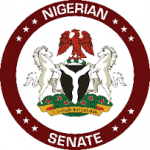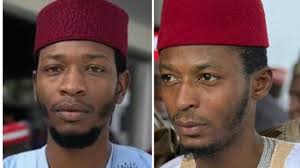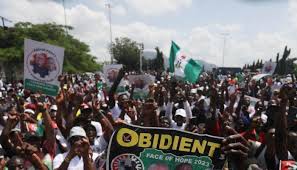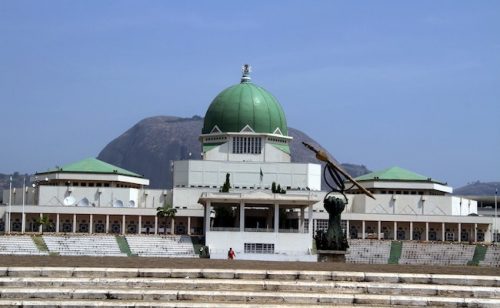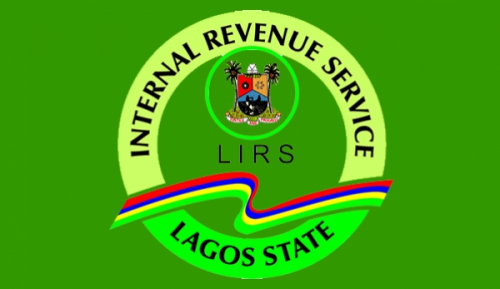2019: Uproar as election sequence divides Senate

.10 senators stage walkout, say 54 members oppose conference report
.Allege fixing of presidential election last, plot against Buhari
.Senate bound to adopt Reps’ resolution without deliberation- Spokesman
The Senate on Wednesday witnessed a rowdy session as senators loyal to President Mumammadu Buhari staged a walk out in protest against the adoption of a Conference Committee Report on a Bill to amend the Electoral Act of 2010 on re-ordering of sequence of election in 2019.
The amendment also provides a timeline for submission of list of Candidates, Political Party Primaries, Use of Technological devices for the next election, Limit of Campaign Expenses and the Omission of names of candidates or logos of political parties.
The Senators numbering 10, led by Senator Adamu Abdulahi (APC, Nasarawa) addressed the media complaining against the manner the Committee Report was adopted, vowing to ensure the reversal.
The development indicated a crack in the Senate in which case majority of Senators have been providing the bulwark of support for the leadership.
Earlier, the chairman, Senate Committee on the Independent National Electoral Commission, Senator Suleiman Nazif (APC, Bauchi North) had presented the report at the plenary while the process of adoption caused ripples among Senators.
Trouble started when the Senate President, Bukola Saraki, put the adoption of the report to voice vote, and did not allow full vote by Senators while he ruled for the report to be adopted.
Saraki said there was no need for debate on the report since, according to him, it was from a conference committee, which had harmonised the versions of the two chambers.
The Senate President also ruled against senators who raised points of order to protest against the adoption.
Against this background, the Senator Abdulahi group picked hole in the Senate President’s decision to overrule a point of order raised by Senators Ovie Omo-Agege (APC, Delta) and Abdulahi on the Conference Committee report presented by Senator Suleiman Nazif, the chairman of the Joint Committee on INEC.
Addressing the media, Abdulahi alleged that the amendment of the Electoral Act which places Presidential election last for 2019 was aimed towards subverting the chances of President Buhari during the 2019 presidential election.
Senator Adamu said the decision by the Senate on the amendment would not stand since, according to him, 59 senators were never in support of the amendment of Section 25 of the Amendment Act.
The group also berated Saraki for foisting the bill on his colleagues.
They argued that only 36 members were in attendance when the House of Representatives passed the bill, which was not in accordance with legislative procedures.
The aggrieved Senators argued that reordering of the election timetable was a clandestine move targeted at the re-election bid of President Buhari.
Abdulahi said the group was not particular about Buhari or protecting his interest, but was rather obliged to protect the Office of the President as an institution.
He added that Section 132 of the Act gives INEC power to fix date for the election into the office of the President.
On Abdullahi’s team were senators Yahaya Abdulahi (Kebbi), Gumel (Jigawa), Ali Wakili (Bauchi), Ovie Omo- Agege (Delta), Binta Mashi Garba (Adamawa), Abu Ibrahim (Katsina), Andrew Uchendu (Rivers), and Ben Uwajumobia (Imo).
In his reaction, the spokesman of the Senate, Senator Aliyu Sabi Abdulahi, said the Senate was bound to adopt the resolution of the House of Representatives on the issue without further deliberation if it is from conference committee.
When asked on the number of representatives that passed the bill, Sabi said the Senate as national institution will not cast aspersions or denigrate the other chamber.
He said: “I can only speak for the Senate. Constitutionally, they, the House of Representatives have done their own and passed it down to us.
“I can’t as well talk on the number of senators, I can only talk on what transpired on the floor of the Senate and how did it happened.”
Meanwhile, the House of Representatives, on Wednesday, adopted the report of the conference committee on electoral and political party matters that is expected to regulate the conduct of the 2019 general election.
At Wednesday’s consideration of the report of the conference committee on a bill for an Act to amend the provisions of the Electoral Act, 2010 and Electoral Amendment Act, 2015, the House at the committee of the whole which was chaired by Speaker of the House, Hon Yakubu Dogara in the absence of the deputy speaker, approved the harmonised report with the Senate.
Chairman of the House conference committee, Hon Edward Pwajok, disclosed that both chambers of the National Assembly agreed on seven grey areas that were earlier contentious.
But while briefing the session, Pwajok said that it was erroneous for some section of the public to believe that the powers to determine election sequence was not vested in the National Assembly.
He explained that during the first alteration of the 1999 Constitution in 2010, “in giving the Independent National Electoral Commission (INEC) first line charge, it was also stipulated that powers to fix election timetable shall be in accordance with the provisions of the Electoral Act, which obviously is in the jurisdiction of the National Assembly members who review the Act periodically.”
According to him, the election sequence as adopted subsists in the following order- National Assembly, States Houses of Assembly and Governorship, and lastly, the presidential poll.
He added that the order official party primaries, the National Assembly is first, followed by the States assemblies, governorship and the Presidential.
The lawmakers took cognizance of the Kogi State unfortunate election case sequel to the death of a lead governorship aspirant who died when the poll was inconclusive and approved therefore, that in the event of the death of a candidate before the declaration of election result, INEC shall suspend the election not exceeding 21 days to allow for a new primary within 14 days by the party to replace the dead before continuing the polls.
On new political parties formation, both houses agreed that if after 60 days an association applies to INEC for registration, unless INEC communicates to the contrary, it is deemed that the association is registered.
INEC also got the express power to overrule political parties in the country in case of party primaries.
Both houses agreed on a new election spending benchmark.
In the new approval, for presidential campaigns, the expenditure must not be above N5billion from N1billion. Governors are to spend N1billion as against N200million. National Assembly members, the Senators can spend N100million from N40million previously while their counterparts in the House of Representatives have their campaign budget increased to N70million from N20million.
State House of Assembly members N30m from N10million the same goes for Local Government chairmanship candidates while councilors can now spend N5million from N1million previously.
The new electoral law, accordingly has provided a maximum of N10million donation by individuals, corporate entities or any entity to any candidate. A violation to this provision attracts a penalty of one per cent of the amount permitted as limit or 12 months imprisonment or both.
They approved that where the votes cast at an election in any polling unit exceeds the number of accredited voters in that unit, the result of the election shall be declared null and void and another election may be conducted at a date to be fixed by the commission where the result at that polling unit may affect the overall result in that constituency.
Accordingly, the lawmakers said the presiding officer shall announce the result of any election at the polling unit.



